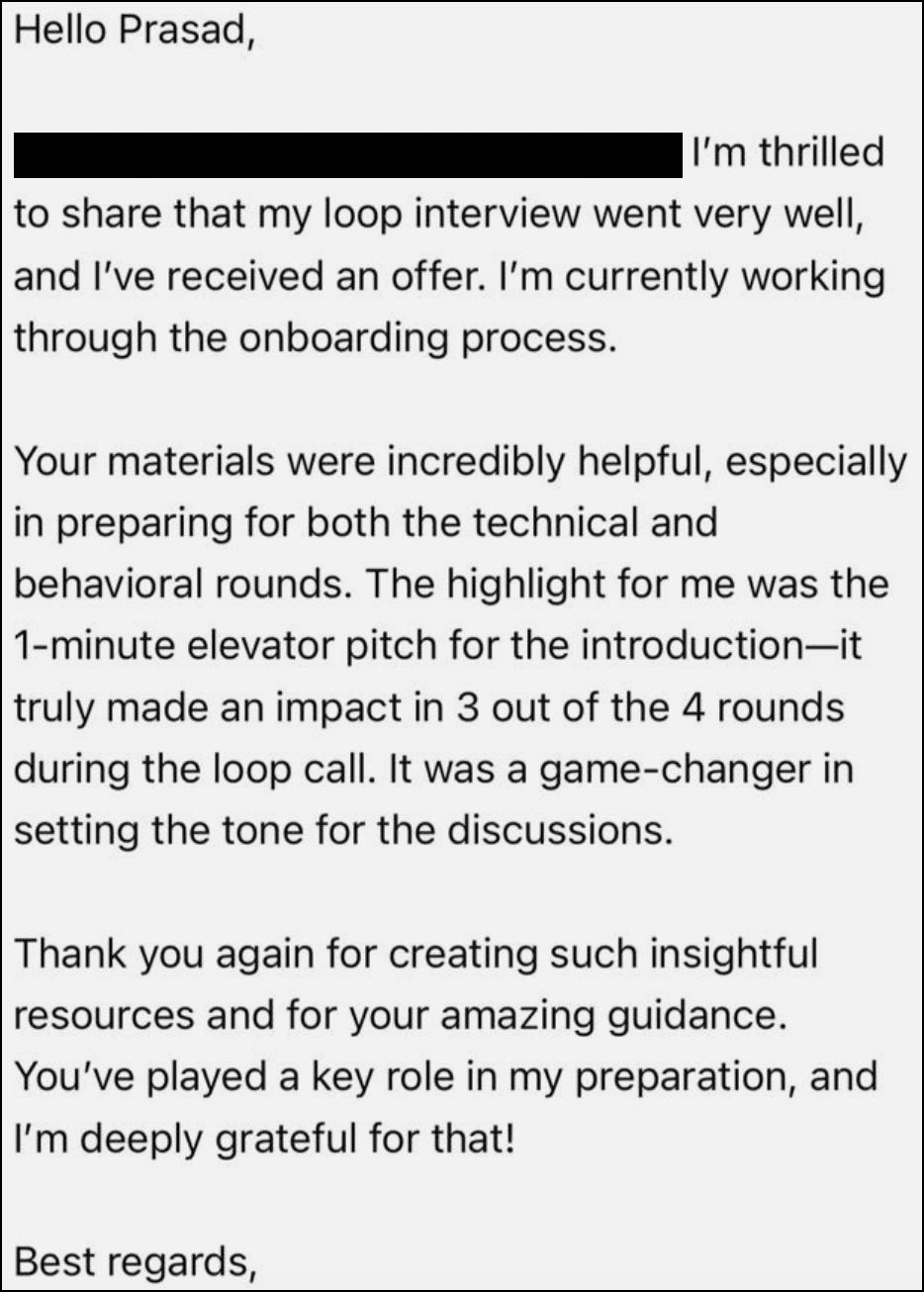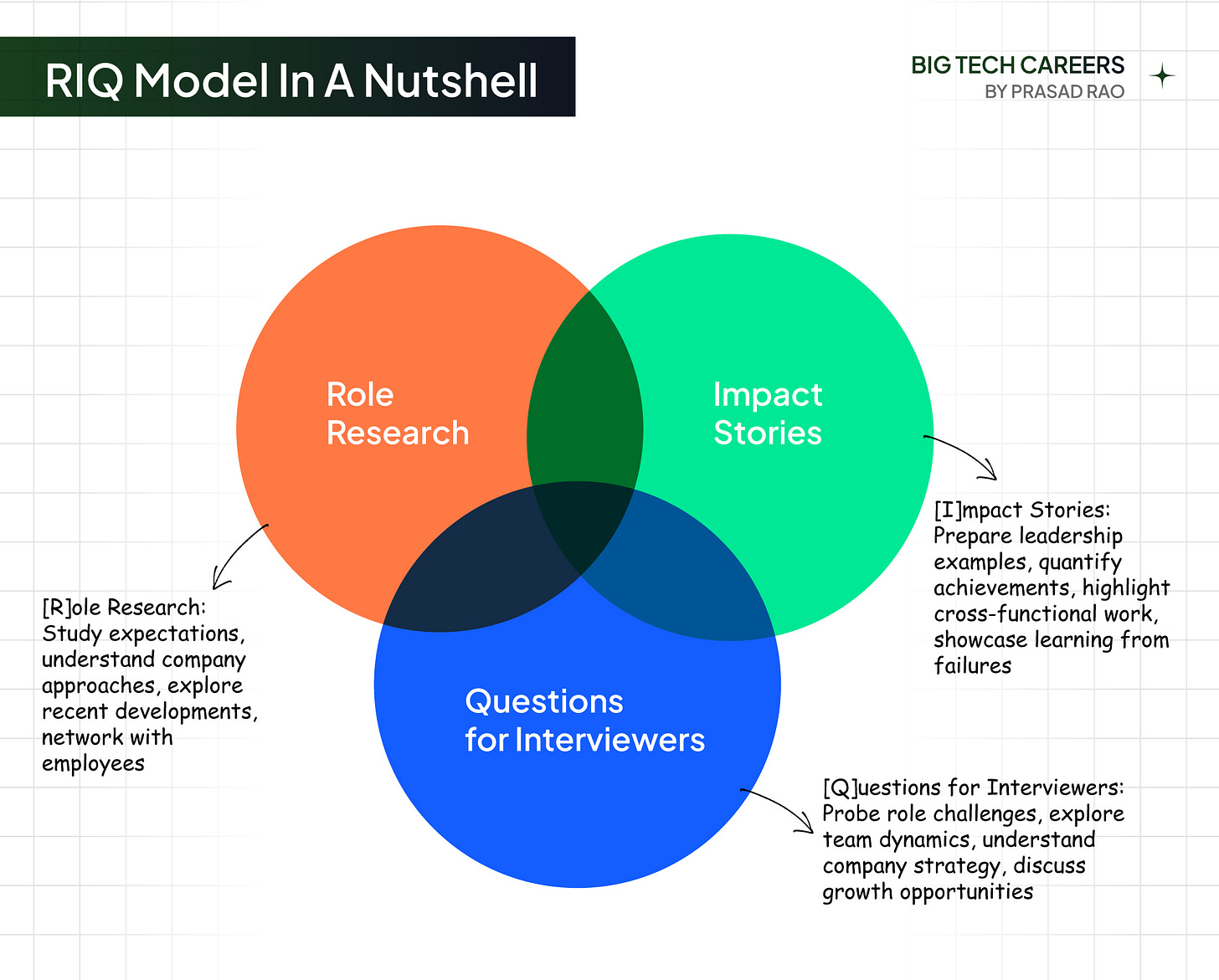How to Know You're Ready to Interview at MAANG+
Assess your interview readiness and use the RIQ Framework to prepare!
This week, let’s start by celebrating a success story!
I frequently receive messages expressing gratitude for my resources and guidance, which is incredibly rewarding.
However, this particular message distinguishes itself by highlighting a very specific point.
The highlight for me was the 1-minute elevator pitch for the introduction—it truly made an impact in 3 out of the 4 rounds during the loop.
It was a game-changer in setting the tone for the discussions.
As I always say, as an interviewee, you have the power to set the tone and direction of the interview. While the interviewer is evaluating you, you can strategically guide the conversation to highlight your strengths.
If you approach the interview with the mindset of playing to your strengths, you're likely more prepared for MAANG+ interviews than you realize.
Don't misunderstand me – this doesn't mean the process will be easy. You still need to prepare extensively, and it will be a lot of hard work. All I'm saying is do not undervalue your skills and experience.
To help you achieve expertise in introducing yourself, STAR format storytelling, and landing a job at MAANG+ companies in 2025, I'm hosting a 9-day live workshop!
Here’s what you’ll gain:
✅ Proven frameworks to ace your interviews at MAANG+ companies.
✅ Strategies to land roles at Amazon, Google, Microsoft & more
✅ Live sessions, mock interviews, and personalised feedback
🗓️ cohort: Dec 14–22, 2024!
I remember when I was going for my AWS interview. First, I was not applying, thinking I did not belong here. Second, during the interview process, I never felt I was ready enough, and that is normal.
Whether you're a software engineer, product manager, data scientist, UX designer, technical program manager, or in any other role, I aim to instill confidence in you and walk you through your journey to interview readiness.
Debunking Common Myths
Let's dive into the common myths preventing you from taking the step of interviewing at MAANG+ companies.
Do any of these barriers sound familiar to you? Perhaps there's another reason keeping you from pursuing your dream opportunity. Whatever it may be, I encourage you to push through your hesitation.
I say this all the time to those who are in self-doubt. I have been there. If I can do it, you can do it too.
Let’s see what is needed to get into MAANG+ and change your career’s trajectory 🎯
Success at MAANG+ companies is built on a few fundamental pillars:
Excellence in your technical/functional domain
You need to have expertise in your field. Period.
But excellence is not about you knowing everything but about developing an understanding of the core principles of your field, continuous learning, and the ability to collaborate effectively.
Your practical experience is your real strength, turning abstract concepts into tangible solutions. Learn to see beyond your immediate role, understand how you connect with other teams, and master the art of explaining complex ideas so anyone can get excited about your work.
Be a problem solver
When faced with a complex problem, the best candidates don't rush to solutions—they pause, dissect the challenge systematically, and ask critical clarifying questions.
Your approach needs to be data-driven, moving beyond gut instincts to rigorous analysis, especially at a scale where intuition falls short. Learn to see beyond your immediate perspective by considering multiple stakeholders and their competing priorities.
The real impact happens when you can balance immediate needs with a strategic vision. Interviews at MAANG+ test your ability to think critically, communicate clearly, and navigate ambiguity.
Cross-Functional Collaboration
Here's the truth about success of any project success: most failures happen because teams can't communicate effectively.
Your superpower is bridging gaps—speaking the language of both technical and non-technical stakeholders, understanding how each role drives project success, and influencing outcomes without direct authority.
It's not about your title, but your ability to connect, translate, and align diverse perspectives toward a common goal.
Anyone who has been in the industry for a while will have experience with these fundamental pillars. So, how to ensure success in MAANG+ interviews?
The R-I-Q Framework: Your Interview Breakthrough
R-I-Q stands for Role research, Impact Stories, and Questions for Interviewers—a strategic approach I designed based on my experience to help you stand out in MAANG+ interviews.
Role Research
The first step in the RIQ framework is to conduct a meticulous Role Research.
Start by:
Reviewing job descriptions across MAANG for your matching roles
Identifying common requirements and expectations
Comparing your experience against these benchmarks
Note areas where you need growth
I had to browse through hundreds of job openings at AWS to find ONE role that matched my experience. It’s hard work and there is no short cut to it.
Role Research is crucial because it allows you to tailor your responses and showcase your fit for the role. By understanding the company's pain points and the key responsibilities of the position, you can align your experiences and achievements to demonstrate your value proposition.
This is your first step to start the interview process using your strengths and superpowers.
Impact Stories
Impact Stories are the backbone of a successful MAANG+ interview. They allow you to showcase your accomplishments in a compelling and memorable way, while also highlighting your transferable skills and the positive impact you've had in your previous roles.
Document your journey:
List projects that demonstrate key competencies
Identify gaps you have in your technical/functional domain
Look for missing types of challenges or situations
Consider breadth vs. depth of experience
Here is the question bank that can help you with scenarios for which you need to prepare your stories. And these stories will help you in multiple interviews irrespective of which role you are applying for.
The art of storytelling in interviews is more important than you think and it goes beyond rehearsed answers.
You should find yourself naturally explaining how your experience aligns with the role, discussing career decisions with genuine insight, and sharing both successes and failures with equal comfort.
Questions for Interviewers
The final pillar of the RIQ framework involves preparing a set of insightful questions to ask the interviewer. These "Questions for Interviewers" serve a dual purpose: they allow you to gather valuable information about the role, the team, and the company, while also demonstrating your genuine interest and engagement in the interview process.
When formulating Questions for Interviewers, you should consider the following areas:
Probe role challenges: Inquire about the specific challenges the role typically faces, as well as any recent changes or initiatives that have impacted the position. This can help you better understand the problem-solving skills required for the job.
Explore team dynamics: Ask about the team structure, the collaborative nature of the work, and the communication styles within the department. Understanding the team dynamics can help you assess your fit and ability to thrive in the work environment.
Understand company strategy: Delve into the company's overarching vision, strategic priorities, and areas of focus. This can provide valuable insights into the organization's direction and how the role contributes to the broader business goals.
Discuss growth opportunities: Inquire about potential career development paths, training programs, and opportunities for professional growth within the organization. This demonstrates your long-term commitment and desire to contribute to the company's success.
Asking thoughtful questions during the interview shows that you're not just looking to land the job, but that you're truly invested in understanding the company's needs and how you can contribute to its success.
Putting RIQ into Practice
The RIQ framework is designed to be a holistic approach to MAANG+ interview preparation, with each component complementing and reinforcing the others. By meticulously researching the role, crafting impactful stories, and formulating insightful questions, you can position yourself as a well-rounded, adaptable, and highly desirable candidate.
The RIQ framework is not just about ticking boxes during the interview process. It's about developing a deep understanding of the opportunity, highlighting your unique value proposition, and engaging in a dynamic, two-way conversation that showcases your fit for the role.
😄 Good news - The company wants you as much as you want the company!
Interview readiness at MAANG companies isn't about checking every possible box – it's about having a strong foundation in your domain, demonstrated impact, and the ability to learn and grow. Remember, you're not just being interviewed but also interviewing them. Are they the right fit for your dreams and values?
The best candidates aren't necessarily the most experienced – they're the ones who can communicate their value and show growth potential.
I’m here to help! Join the like-minded people to clear MAANG+ interviews in a 9-day live workshop.
In this interactive workshop, you'll learn:
How to deliver high-impact responses in STAR format
How to effectively articulate your leadership experiences
How to share lessons learned from past failure experiences
How to craft senior-level responses to get hired at the right level
Not sure yet if this workshop is right for you? Here is how you can contact me for any queries:
Send me an email at bigtechcareers@gmail.com
Ping me on the substack app
DM me on LinkedIn
Limited seats. Grab yours now!







"you have the power to set the tone" - exactly this. Don't be a passenger. Be a driver of the conversation and set the frame to lead and solve problems. I stress this a lot in my frameworks.
Also, ever heard of BlueOptima?
Exactly!
I transitioned there to Meta. FAANG companies don't care where you come from as long as you can solve problems during interviews.